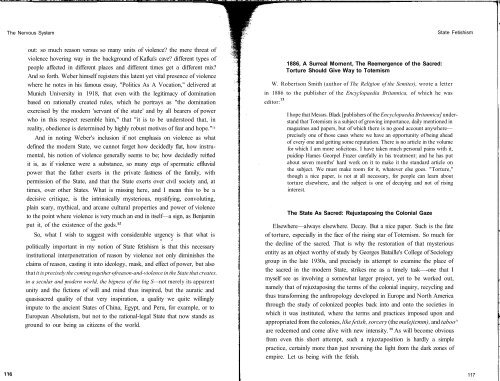The Nervous System - Department of English and Comparative ...
The Nervous System - Department of English and Comparative ...
The Nervous System - Department of English and Comparative ...
You also want an ePaper? Increase the reach of your titles
YUMPU automatically turns print PDFs into web optimized ePapers that Google loves.
<strong>The</strong> <strong>Nervous</strong> <strong>System</strong><br />
State Fetishism<br />
out: so much reason versus so many units <strong>of</strong> violence? the mere threat <strong>of</strong><br />
violence hovering way in the background <strong>of</strong> Kafka's cave? different types <strong>of</strong><br />
people affected in different places <strong>and</strong> different times get a different mix?<br />
And so forth. Weber himself registers this latent yet vital presence <strong>of</strong> violence<br />
where he notes in his famous essay, "Politics As A Vocation," delivered at<br />
Munich University in 1918, that even with the legitimacy <strong>of</strong> domination<br />
based on rationally created rules, which he portrays as "the domination<br />
exercised by the modern 'servant <strong>of</strong> the state' <strong>and</strong> by all bearers <strong>of</strong> power<br />
who in this respect resemble him," that "it is to be understood that, in<br />
reality, obedience is determined by highly robust motives <strong>of</strong> fear <strong>and</strong> hope."<br />
And in noting Weber's inclusion if not emphasis on violence as what<br />
defined the modern State, we cannot forget how decidedly flat, how instrumental,<br />
his notion <strong>of</strong> violence generally seems to be; how decidedly reined<br />
it is, as if violence were a substance, so many ergs <strong>of</strong> spermatic effluvial<br />
power that the father exerts in the private fastness <strong>of</strong> the family, with<br />
permission <strong>of</strong> the State, <strong>and</strong> that the State exerts over civil society <strong>and</strong>, at<br />
times, over other States. What is missing here, <strong>and</strong> I mean this to be a<br />
decisive critique, is the intrinsically mysterious, mystifying, convoluting,<br />
plain scary, mythical, <strong>and</strong> arcane cultural properties <strong>and</strong> power <strong>of</strong> violence<br />
to the point where violence is very much an end in itself—a sign, as Benjamin<br />
put it, <strong>of</strong> the existence <strong>of</strong> the gods.<br />
So, what I wish to suggest with considerable urgency is that what is<br />
Do o J<br />
politically important in my notion <strong>of</strong> State fetishism is that this necessary<br />
institutional interpenetration <strong>of</strong> reason by violence not only diminishes the<br />
claims <strong>of</strong> reason, casting it into ideology, mask, <strong>and</strong> effect <strong>of</strong> power, but also<br />
that it is precisely the coming together <strong>of</strong>reason-<strong>and</strong>-violence in the State that creates,<br />
in a secular <strong>and</strong> modern world, the bigness <strong>of</strong> the big S—not merely its apparent<br />
unity <strong>and</strong> the fictions <strong>of</strong> will <strong>and</strong> mind thus inspired, but the auratic <strong>and</strong><br />
quasisacred quality <strong>of</strong> that very inspiration, a quality we quite willingly<br />
impute to the ancient States <strong>of</strong> China, Egypt, <strong>and</strong> Peru, for example, or to<br />
European Absolutism, but not to the rational-legal State that now st<strong>and</strong>s as<br />
ground to our being as citizens <strong>of</strong> the world.<br />
1886, A Surreal Moment, <strong>The</strong> Reemergence <strong>of</strong> the Sacred:<br />
Torture Should Give Way to Totemism<br />
W. Robertson Smith (author <strong>of</strong> <strong>The</strong> Religion <strong>of</strong> the Semites), wrote a letter<br />
in 1886 to the publisher <strong>of</strong> the Encyclopaedia Britannica, <strong>of</strong> which he was<br />
editor:<br />
I hope that Messrs. Black [publishers <strong>of</strong> the Encyclopaedia Britannica] underst<strong>and</strong><br />
that Totemism is a subject <strong>of</strong> growing importance, daily mentioned in<br />
magazines <strong>and</strong> papers, but <strong>of</strong> which there is no good account anywhere—<br />
precisely one <strong>of</strong> those cases where we have an opportunity <strong>of</strong> being ahead<br />
<strong>of</strong> every one <strong>and</strong> getting some reputation. <strong>The</strong>re is no article in the volume<br />
for which I am more solicitous. I have taken much personal pains with it,<br />
puidinp Hames Georpel Frazer carefully in his treatment: <strong>and</strong> he has put<br />
about seven months' hard work on it to make it the st<strong>and</strong>ard article on<br />
the subject. We must make room for it, whatever else goes. "Torture,"<br />
though a nice paper, is not at all necessary, for people can learn about<br />
torture elsewhere, <strong>and</strong> the subject is one <strong>of</strong> decaying <strong>and</strong> not <strong>of</strong> rising<br />
interest.<br />
<strong>The</strong> State As Sacred: Rejuxtaposing the Colonial Gaze<br />
Elsewhere—always elsewhere. Decay. But a nice paper. Such is the fate<br />
<strong>of</strong> torture, especially in the face <strong>of</strong> the rising star <strong>of</strong> Totemism. So much for<br />
the decline <strong>of</strong> the sacred. That is why the restoration <strong>of</strong> that mysterious<br />
entity as an object worthy <strong>of</strong> study by Georges Bataille's College <strong>of</strong> Sociology<br />
group in the late 1930s, <strong>and</strong> precisely its attempt to examine the place <strong>of</strong><br />
the sacred in the modern State, strikes me as a timely task—-one that I<br />
myself see as involving a somewhat larger project, yet to be worked out,<br />
namely that <strong>of</strong> rejuxtaposing the terms <strong>of</strong> the colonial inquiry, recycling <strong>and</strong><br />
thus transforming the anthropology developed in Europe <strong>and</strong> North America<br />
through the study <strong>of</strong> colonized peoples back into <strong>and</strong> onto the societies in<br />
which it was instituted, where the terms <strong>and</strong> practices imposed upon <strong>and</strong><br />
appropriated from the colonies, like fetish, sorcery (the malejicmm), <strong>and</strong> taboo^<br />
are redeemed <strong>and</strong> come alive with new intensity. As will become obvious<br />
from even this short attempt, such a rejuxtaposition is hardly a simple<br />
practice, certainly more than just reversing the light from the dark zones <strong>of</strong><br />
empire. Let us being with the fetish.<br />
117
















